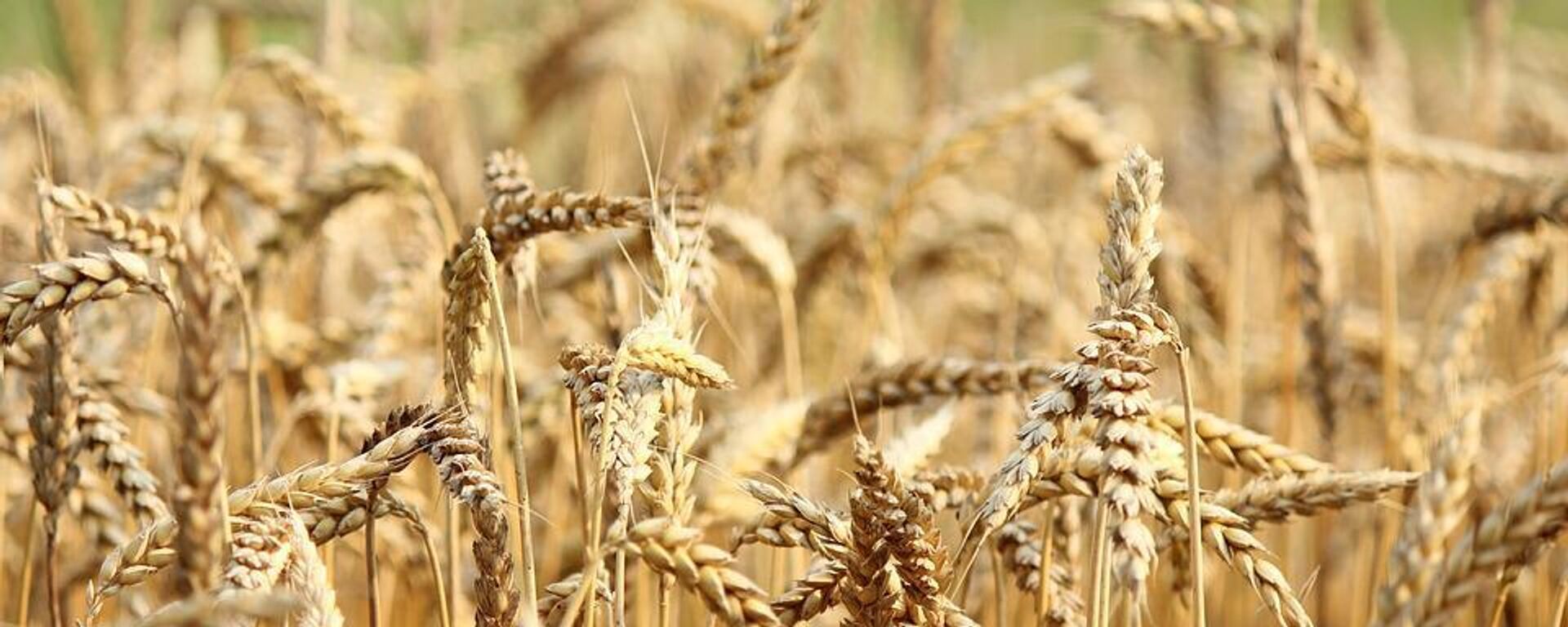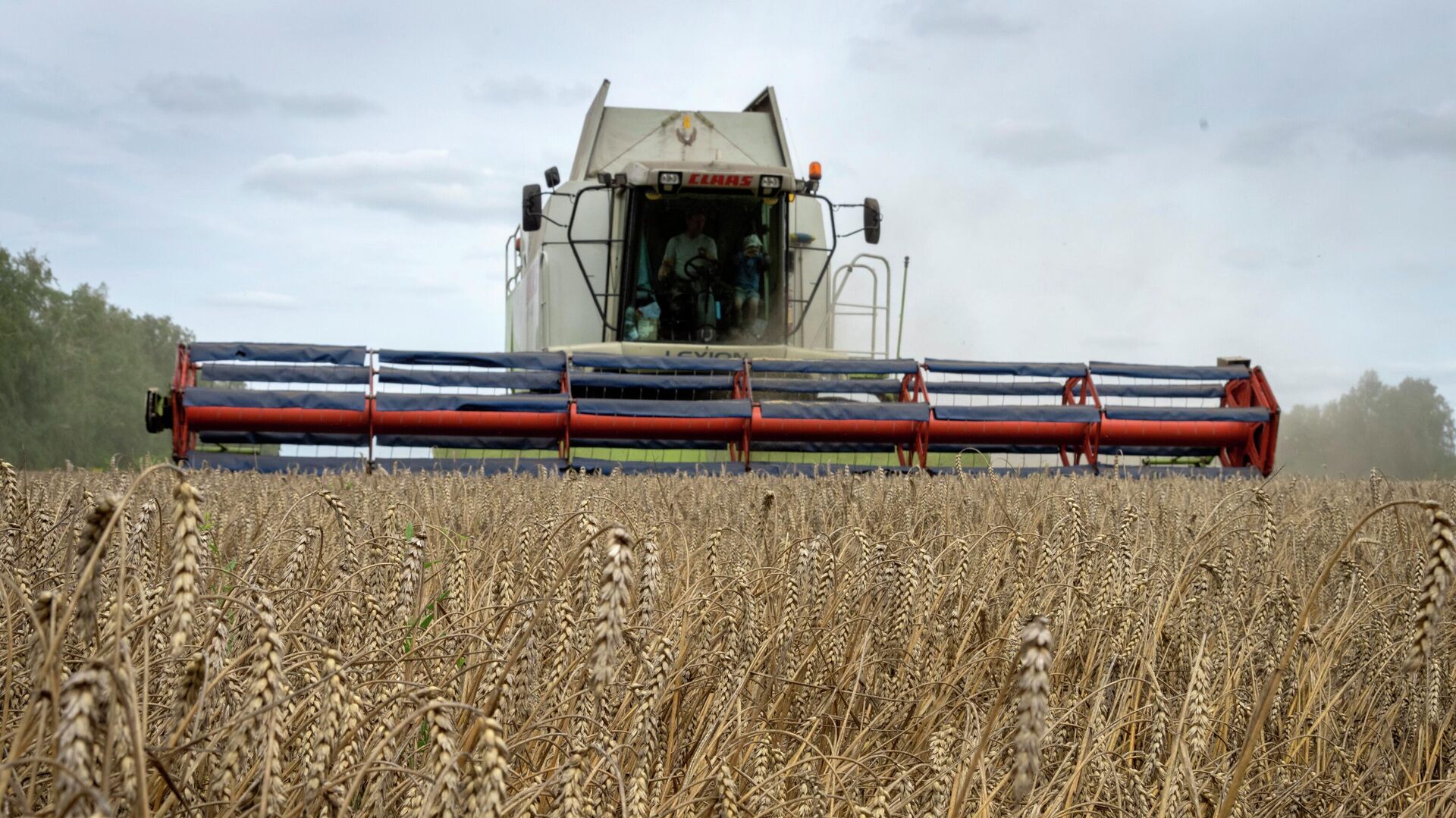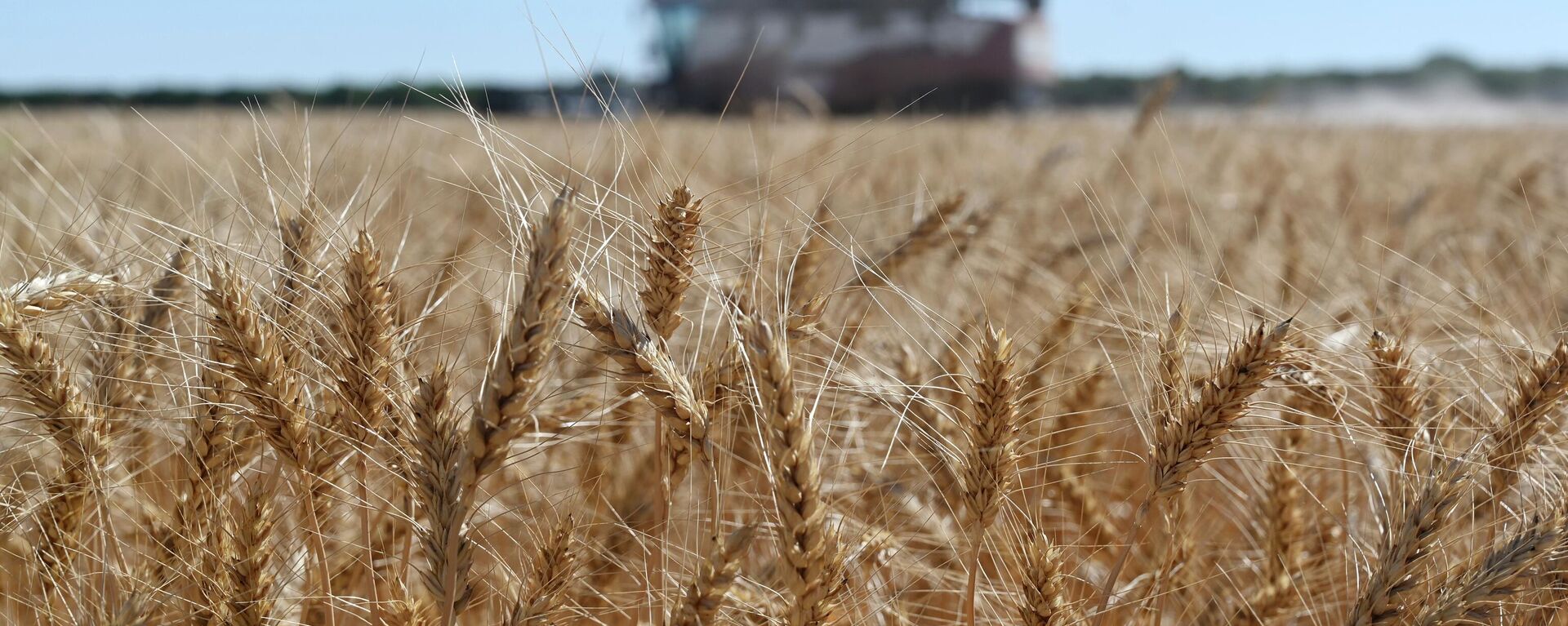https://sputnikglobe.com/20230418/eu-dissenters-ban-ukraines-food-as-blocs-unity-crumbles-1109616681.html
EU Dissenters Ban Ukraine's Food as Bloc's Unity Crumbles
EU Dissenters Ban Ukraine's Food as Bloc's Unity Crumbles
Sputnik International
Poland and Hungary have banned imports of Ukrainian grain and other foods with Slovakia jumping on their bandwagon and Bulgaria fixing to follow suit.
2023-04-18T09:27+0000
2023-04-18T09:27+0000
2023-04-18T09:27+0000
analysis
opinion
europe
ukraine
russia
grain
sanctions
food crisis
south africa
north africa
https://cdn1.img.sputnikglobe.com/img/07e6/09/0e/1100758304_0:0:3094:1740_1920x0_80_0_0_cd66d0cb8c9a9bbe9f9aab9085d5d147.jpg
"EU imports of Ukrainian grains have skyrocketed relative to the prior year," Marc Ostwald, chief economist at ADM Investor Services International, told Sputnik."A lot has ended up piling up in Central and Eastern Europe (CEE), in no small part due to logistical problems in transporting it further," he continued, explaining that this is "indirectly related to bans on imports of Russian coal (e.g. in Poland), which has meant coal has to be imported from elsewhere, thus creating bottlenecks."Last week, Poland placed a temporary ban on the import of grain, oil seeds and other agricultural products from Ukraine following protests by angry Polish farmers, who say they've been thrown under the bus due to a glut of cheap Ukrainian grain. The restrictions will remain in place until the end of June.Budapest signaled Saturday that it would join Poland's initiative. Hungarian grain producers lost between 23% and 37% of their income over the past year as grain imports from Ukraine jumped from 40,000-60,000 tons to 2.5 million tons, as per Hungarian Agriculture Minister Istvan Nagy.On Sunday, his Bulgarian counterpart Yavor Gechev said that Sofia was also fixing to place restrictions on the influx of Ukrainian foods. The next day, Slovak Prime Minister Eduard Heger announced that Slovakia would ban Ukrainian food imports through June 30. He earlier stated that tests of 1,500 tons of grain originating from Ukraine revealed it contained a pesticide banned in the EU.'EU-Ukraine Solidarity Lanes'Last year, Brussels lifted all tariffs and quotas on the Ukrainian commodity into the bloc’s 27 member states, justifying the move by the necessity to facilitate its transit around the world, including to Africa. The European Commission dubbed the initiative as "EU-Ukraine Solidarity Lanes". The strategy envisaged unblocking borders with Ukraine and using roads, rail routes and maritime lanes to take tens of millions of tons of grain out of Ukraine while freeing warehouse capacity inside EU countries to store excess products.However, it later turned out that most grain remained stuck in the Old Continent. When it comes to the Russo-Ukrainian maritime grain deal aimed at transferring the Ukrainian grain to the Global South, most of the food products inexplicably ended up in Europe, too.All in all, around 45% of Ukrainian grain has gone to European countries and only 3% to Africa, Russian President Vladimir Putin revealed during the Second International Parliamentary Conference "Russia – Africa" held on March 20.Bulgaria, Hungary, Poland, Romania and Slovakia have repeatedly called on Brussels to move all surplus grain out of their states toward Africa and the Middle East for humanitarian purposes within the framework of the EU-Ukraine Solidarity Lanes. What's more, an Austrian newspaper reported in February that Ukrainian wheat was allegedly used as "feed for pigs" in Spain, one of the largest pork producers in the world.Divisions Growing Within the EUThe European Commission subjected dissenting CEE countries to criticism and rejected the newly introduced bans, arguing that a solution must be found that respects the EU legal framework. However, the solution is long overdue, prompting more countries to join the initiative to restrict the flow of Ukrainian foods, said Ostwald."There are so many logistical capacity constraints – storage, road, rail and port constraints – the likes of Varna and Constanta don’t have the capacity to deal with the increase in volume, and Gdansk and Gdynia are poorly equipped for grain shipments, and nor are the railway networks, and while there is capacity in Germany… getting it to Germany is a huge problem, and costly. The debt crises in many developing countries are also a major problem, with FX reserves badly depleted," Ostwald continued.The unfolding Ukraine food imports problem adds to the growing conflict fatigue among Europeans, according to the economist. He particularly cited strains related to arming Ukraine, bans on Russian energy imports, and other issues which in no small part reflect longer-standing tensions between EU countries. Growing divisions within the bloc are fanned by simmering inflation, uncertainty about energy imports with the EU’s gas shortfall in 2023 projected to be as high as 57 billion cubic meters, and further economic slowdown.
https://sputnikglobe.com/20230417/unilateral-actions-unacceptable-eu-slams-poland-hungary-for-ban-on-ukraine-grain-imports-1109584200.html
https://sputnikglobe.com/20230120/how-west-used-global-food-crisis-to-whip-up-profits-seize-russias-niche-in-market-1106535089.html
ukraine
russia
south africa
north africa
central africa
sub-saharan africa
hungary
poland
slovakia
Sputnik International
feedback@sputniknews.com
+74956456601
MIA „Rossiya Segodnya“
2023
News
en_EN
Sputnik International
feedback@sputniknews.com
+74956456601
MIA „Rossiya Segodnya“
Sputnik International
feedback@sputniknews.com
+74956456601
MIA „Rossiya Segodnya“
ukraine food imports, poland and hungary banned ukraine grain, temporary bans on ukraine grain eu, slovakia banned ukraine food imports, european farmers losing profits, grain glut in eu, global south food crisis, africa food crisis, russian grain deal, eu sanctions prevent russia from selling foods, eu energy crisis, eu economic slowdown, eu recession
ukraine food imports, poland and hungary banned ukraine grain, temporary bans on ukraine grain eu, slovakia banned ukraine food imports, european farmers losing profits, grain glut in eu, global south food crisis, africa food crisis, russian grain deal, eu sanctions prevent russia from selling foods, eu energy crisis, eu economic slowdown, eu recession
EU Dissenters Ban Ukraine's Food as Bloc's Unity Crumbles
Poland and Hungary have banned imports of Ukrainian grain and other foods, with Slovakia jumping on their bandwagon and Bulgaria fixing to follow suit. The EU lifted tariffs on Ukraine's agricultural products last year, leaving Central and Eastern European food producers in jeopardy.
"EU imports of Ukrainian grains have skyrocketed relative to the prior year," Marc Ostwald, chief economist at ADM Investor Services International, told Sputnik.
"A lot has ended up piling up in Central and Eastern Europe (CEE), in no small part due to logistical problems in transporting it further," he continued, explaining that this is "indirectly related to bans on imports of Russian coal (e.g. in Poland), which has meant coal has to be imported from elsewhere, thus creating bottlenecks."
That accumulation of stocks has served to depress prices because Ukrainian grains are much cheaper to produce and therefore sell at lower prices than local production in the CEE countries. The situation is compounded as Poland’s Agriculture Ministry advised farmers to stockpile rather than sell produce 'in anticipation of higher prices following the war', but they are now under pressure to offload stockpiles ahead of the new season. It also reflects the fact that the UN Grain corridor has not facilitated as much direct exports out of Ukraine as had been hoped.
Marc Ostwald
Chief economist at ADM Investor Services International
Last week, Poland placed a temporary ban on the import of grain, oil seeds and other agricultural products from Ukraine following protests by angry Polish farmers, who say they've been thrown under the bus due to a glut of cheap Ukrainian grain. The restrictions will remain in place until the end of June.
Budapest signaled Saturday that
it would join Poland's initiative. Hungarian grain producers
lost between 23% and 37% of their income over the past year as grain imports from Ukraine jumped from 40,000-60,000 tons to 2.5 million tons, as per Hungarian Agriculture Minister Istvan Nagy.
On Sunday, his Bulgarian counterpart Yavor Gechev said that Sofia was also fixing to place restrictions on the influx of Ukrainian foods. The next day, Slovak Prime Minister Eduard Heger announced that
Slovakia would ban Ukrainian food imports through June 30. He earlier stated that tests of 1,500 tons of grain originating from Ukraine revealed it contained a pesticide banned in the EU.
'EU-Ukraine Solidarity Lanes'
Last year, Brussels lifted all tariffs and quotas on the Ukrainian commodity into the bloc’s 27 member states, justifying the move by the necessity to facilitate its transit around the world, including to Africa.
The European Commission dubbed the initiative as "EU-Ukraine Solidarity Lanes". The strategy envisaged unblocking borders with Ukraine and using roads, rail routes and maritime lanes to take tens of millions of tons of grain out of Ukraine while freeing warehouse capacity inside EU countries to store excess products.
However, it later turned out that most grain remained stuck in the Old Continent. When it comes to the Russo-Ukrainian maritime grain deal aimed at transferring the Ukrainian grain to the Global South, most of the food products inexplicably ended up in Europe, too.
All in all, around 45% of Ukrainian grain has gone to European countries and only 3% to Africa, Russian President Vladimir Putin
revealed during the Second International Parliamentary Conference "Russia – Africa" held on March 20.
According to the Russian president, a whopping 827 ships have left Ukrainian ports under the grain deal struck by Moscow and Kiev, since August 2022; however, only three million tons of grain ended up in Africa, while the lion's share of grain was grabbed by the EU. For comparison's sake, Russia has delivered 12 million tons of grain to African countries despite sweeping sanctions slapped on almost all sectors of Russia's economy by the West.
Bulgaria, Hungary, Poland, Romania and Slovakia have repeatedly called on Brussels to move all surplus grain out of their states toward Africa and the Middle East for humanitarian purposes within the framework of the EU-Ukraine Solidarity Lanes. What's more, an Austrian newspaper reported in February that
Ukrainian wheat was allegedly used as "feed for pigs" in Spain, one of the largest pork producers in the world.

20 January 2023, 18:10 GMT
Divisions Growing Within the EU
The European Commission subjected dissenting CEE countries to criticism and rejected the newly introduced bans, arguing that a solution must be found that respects the EU legal framework. However, the solution is long overdue, prompting more countries to join the initiative to restrict the flow of Ukrainian foods, said Ostwald.
"Romania and Bulgaria are obvious candidates to join the ban," the economist said. "The EU Commission needs to act quickly, though a resolution mechanism is not obvious above all given the logistical obstacles, and the risk of a termination of the UN Grain Corridor on 18th May only piles on the pressure for some form of measures to resolve the situation, and it may have to involve an array of temporary subsidies."
"There are so many logistical capacity constraints – storage, road, rail and port constraints – the likes of Varna and Constanta don’t have the capacity to deal with the increase in volume, and Gdansk and Gdynia are poorly equipped for grain shipments, and nor are the railway networks, and while there is capacity in Germany… getting it to Germany is a huge problem, and costly. The debt crises in many developing countries are also a major problem, with FX reserves badly depleted," Ostwald continued.
The unfolding Ukraine food imports problem adds to the growing conflict fatigue among Europeans, according to the economist. He particularly cited strains related to arming Ukraine, bans on Russian energy imports, and other issues which in no small part reflect longer-standing tensions between EU countries. Growing divisions within the bloc are fanned by simmering inflation, uncertainty about energy imports with the EU’s gas shortfall in 2023 projected to be as high as 57 billion cubic meters, and further economic slowdown.




